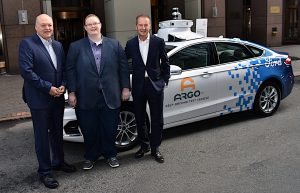
Ford President and CEO Jim Hackett, Argo AI CEO Bryan Salesky and Volkswagen CEO Herbert Diess announced Volkswagen is joining Ford in investing in Argo AI.
The collaboration Ford and Volkswagen formally announced on Friday could grow significantly larger, the automakers said during a New York City news conference on Friday morning, with the possibility of them adding new projects while also leaving the door open to bringing other manufacturers into the fold.
The two new projects cover autonomous and electrified vehicles and follow on top of the joint venture Ford and VW announced in January that will have them work together on the development of future commercial vehicles, such as Ford’s Transit van.
“We have left the door open to further cooperation,” Ford CEO Jim Hackett told TheDetroitBureau.com in an exclusive conversation. He added, however, that, “We haven’t kicked anything off yet.” But industry sources believe they may look at opportunities that could include joint purchasing, as well as marketing and even manufacturing.
While a number of details have been locked in place, there are several things still up in the air as part of the collaboration announced on Friday. For one thing, company officials confirmed Ford will use Volkswagen’s modular MEB platform for a new “passenger vehicle” that will be produced in Europe and targeted for that market, starting in 2023.
(Ford and VW Formally Unveil “Collaboration” on Electric and Autonomous Vehicles)
The four-year delay is required by the need to not only develop an appropriate product but also to convert an existing plant to use the VW battery-car platform, explained Joe Hinrichs, Ford’s president of automotive operations. Eventually, the two expect to see the Detroit automaker produce as many as 600,000 of those vehicles, a figure that could double if Ford moves ahead on a second vehicle program. That’s something that is under study, Hinrichs confirmed, adding that Ford would consider even more products using the MEB platform moving forward.
That said, he told TheDetroitBureau.com that Ford is not going to abandon the platform it has already developed for use in the “Mustang-inspired” all-electric performance SUV – codenamed Mach1 – due to be unveiled later this year. Other battery-electric vehicles, especially in the U.S. market, will be based on that platform. And Ford will also move ahead on a joint venture with Rivian. It announced plans to invest $500 million in that suburban Detroit battery-vehicle start-up earlier this year.
The centerpiece of the deal Ford and VW announced Friday is a collaboration on autonomous vehicles. And it focuses on Argo AI, a Pittsburgh-based start-up in which Ford announced a $1 billion investment two years ago. Volkswagen will now invest more than $3 billion in the collaboration, including $1 billion for a stake in Argo, $500 million to purchase some of Ford’s shares during the next three year, and in the form of rolling its own autonomous research program into Argo.
“We’re on the brink to start commercializing” the technology, said Hackett, though bringing self-driving vehicles to market has proven more difficult than many had expected.
Argo is already running five test programs in cities across the U.S. and will now launch new tests in Europe, with a second base in Munich, said Bryan Salesky, the head of the tech firm, which will continue to operate as an independent company.
(BMW, Daimler announce their own autonomous vehicle collaboration. Click Here for more.)
Salesky said an early production version of an autonomous vehicle using Argo technology will be ready early in the next decade. The target is commercial fleet use but he added his hope that this can help drive down costs enough to make it possible to sell to retail buyers, as well.
Argo, he emphasized, is focusing on Level 4, or geo-fenced, fully driverless technology. That translates into being operable in well-mapped areas and with reasonable weather conditions. Salesky cautioned that the ultimate goal, a Level 5 vehicle capable of going anywhere, at any time, is still “years” away.
While many of the collaborative efforts that Ford and VW are planning will focus on the European and Chinese markets – especially with battery-cars and commercial vehicles, Volkswagen CEO Herbert Diess said the technology is likely to first roll out “in America.”
The two companies are hoping that their various collaborations will save billions of dollars in the long run. In some cases, that will come through consolidating operations. Plans call for sharing production of some future commercial vehicles on Ford or VW assembly plants, for one thing. Higher volumes will translate into increased buying power, meanwhile, when it comes to parts purchasting.
But one of the biggest benefits is expected to come in the form of reduced R&D spending, no mean feat considering the industry is expected to spend $225 billion on the development of electrified vehicles by 2023, according to a new study by AlixPartners. The consultancy also expects spending on autonomous vehicles to reach $85 billion annually by 2025.
(For more on the Ford-Rivian joint venture, Click Here.)
That’s creating what Diess called “resource problems” for even the biggest and most profitable automakers. That, he added, will likely encourage more joint ventures and other collaborations across the industry.
